Opening of the academic year 2019-2020: What inspires academia?
3 September 2019
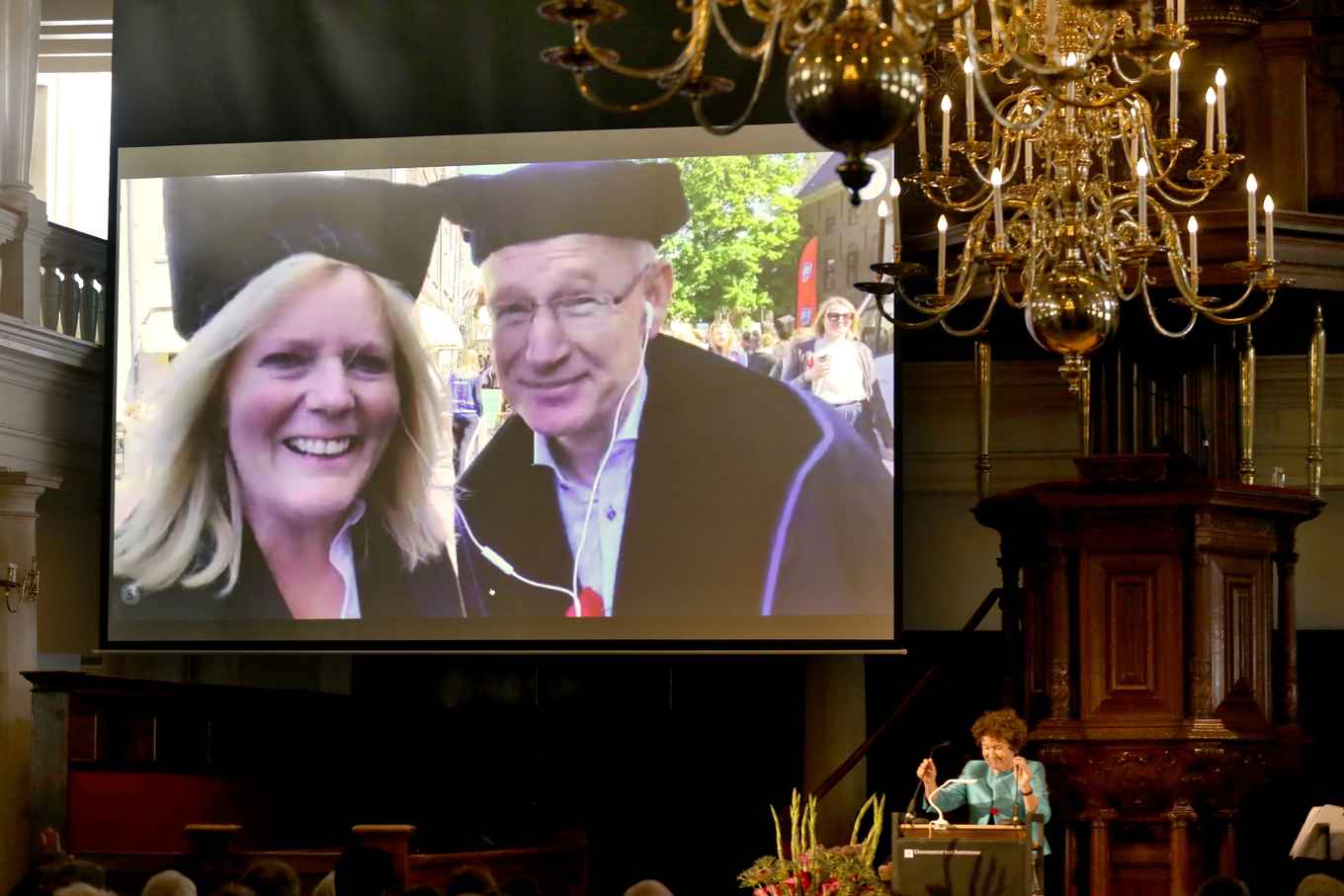
President of the Executive Board Geert ten Dam began with the question: What inspires the Ministry of Education, Culture and Science? ‘At the same time as our celebration, colleagues and students – from the Royal Dutch Academy of Sciences to the National Students Union – are protesting in Leiden. They are standing up against the transfer of money away from the arts, humanities, social sciences and medical sciences and to the natural sciences and technology studies. Attending on behalf of the UvA are Agneta Fischer and Fred Weerman, deans of the Faculty of Social and Behavioural Sciences and the Faculty of Humanities’. Ten Dam then went live to Fischer and Weerman for a short impression of what was happening in Leiden.
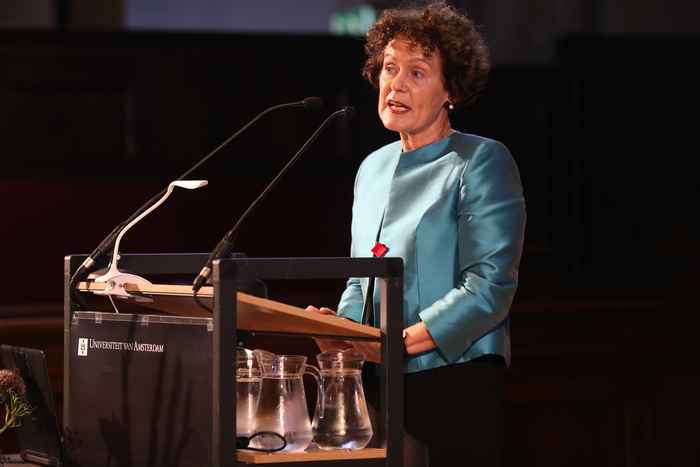
What inspires academia?
Ten Dam then returned to her initial question: What inspires academia? We want to be inspired in our work, in a free academic setting that celebrates debate. What can we do to keep our academic spirits alive and kicking? There are three issues: first, workloads need to be reduced. The increasing regulatory pressure from the government is troubling, as is the reduced funding. We will continue to publicly oppose this. The second issue is the manner in which we value and evaluate our work. And the final issue that we need to address to keep our academic spirits up is social safety. Ten Dam: ‘I can assure you that these issues will be reflected in the strategic plan to be drawn up this year.’
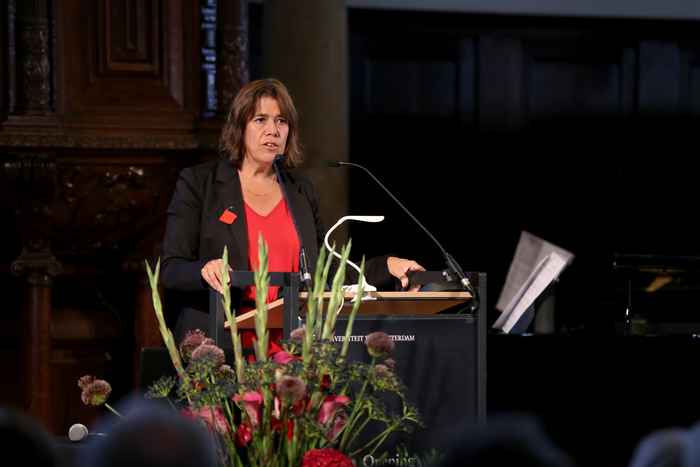
Public knowledge
Daan Roovers, Philosopher Laureate of the Netherlands and Philosophy lecturer, focused in her speech on achieving public knowledge. Knowledge that originates in universities, finds its way out into the world and is of concern to society. How does that process work? And what role does the development of the internet and the digital revolution play in it? To answer these questions, she began with a historical perspective. ‘With only a little exaggeration, you could even say that the 20th century was the century of the intermediary. Myriad mediating bodies sprang up between experts and the public:’ Roovers: ‘The main feature of the digital revolution is its abolition of the intermediary layer and people's new-found ability to cut out the middleman. The supervisory role of the institutions that have traditionally relayed this knowledge to the public is wasting away.’ Scientists seem to have managed to stay out of the firing line, Roovers said. However, although public trust in science remains high in the Netherlands, the general public is no longer waiting eagerly in the wings to watch the latest scientific experiments or hear the latest research findings. ‘In the future, academics will increasingly take on the role of publishers of their own knowledge and they must therefore develop the skills that this demands.’ Roovers finished her speech with: ‘Data can stand alone, but knowledge requires coherence, interpretation and meaningful connection. Let's leave these duties to the universities in order to ensure that as well as being known creatures, we also remain knowing creatures.’
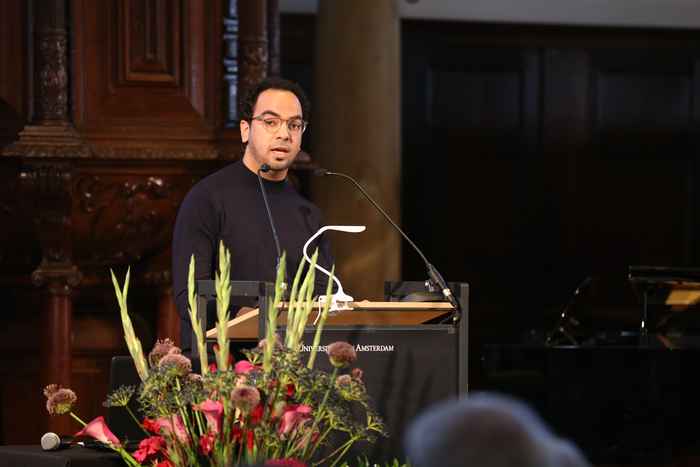
Students for Amsterdam
Moataz Rageb, Master’s student in Sociology and member of the working group on student involvement in society, raised the question of whether student social involvement could be institutionalised. He proposed that it could become part of the curriculum and aligned with goals which the UvA already has in the area of community service learning. In that way students could use their academic skills to help solve existing social problems for the city of Amsterdam and its residents. In addition, they could add depth to theories they know only from books and grow on academic, professional and personal level. Moreover, Rageb suggested that increased social involvement of the UvA’s 34,000 students could also help reduce segregation in the city.
Do you FanSea a straw?
Jasper Luijendijk, Michelle Nierop and Vera van Laarhoven met each other while studying for a minor in Entrepreneurship. That meeting gave birth to FanSea. They told the assembled audience about their solution to the problem of plastic pollution in the sea: drinking straws made of seaweed!
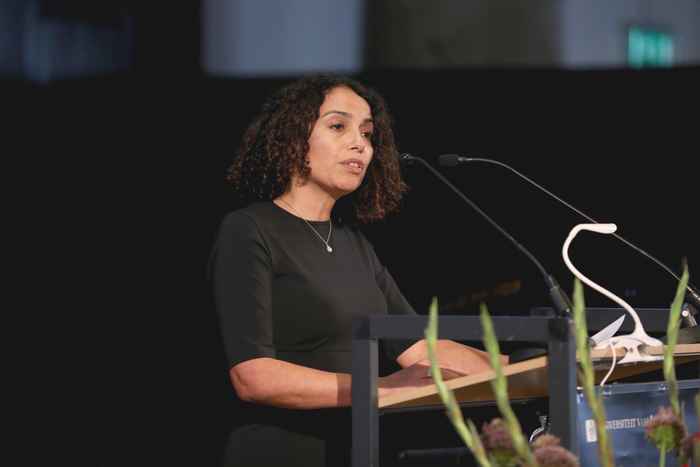
Traces of displacement
Amade M’charek, professor of Anthropology of Science, spoke about her research into the deadly side of European border policies in her presentation ‘Traces of Displacement’, focusing on the many thousands who had died while attempting to reach Europe. She accomplished this partly through images from the documentary ‘Dreams of a cemetery’, in which Dutch documentary programme Zembla followed her in her struggle to give a name to anonymous refugees.
Portraits of committed scientists
Several Master's students in Journalism and Media created video portraits of scientific engagement in society.